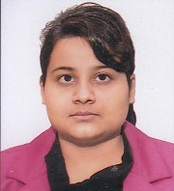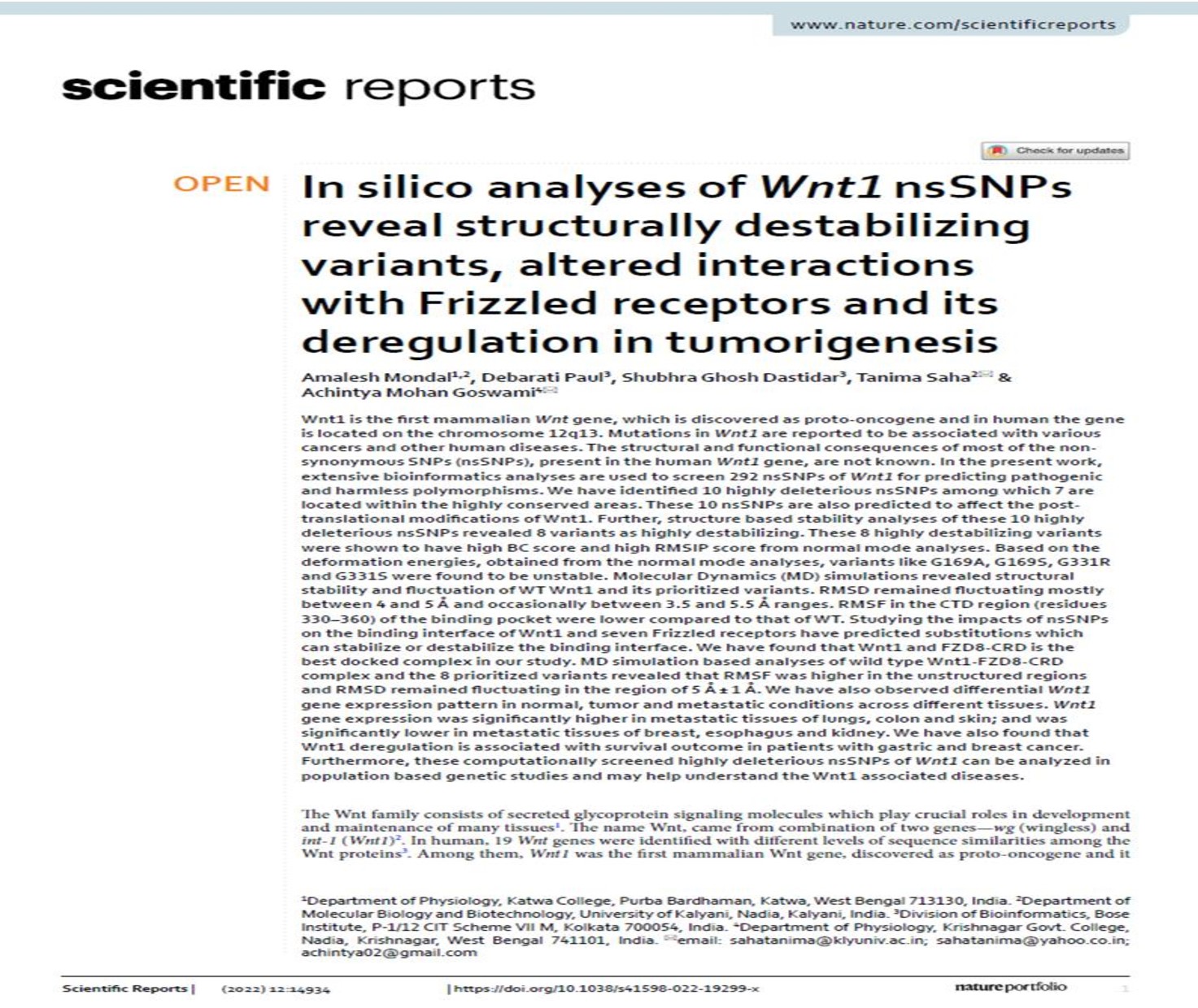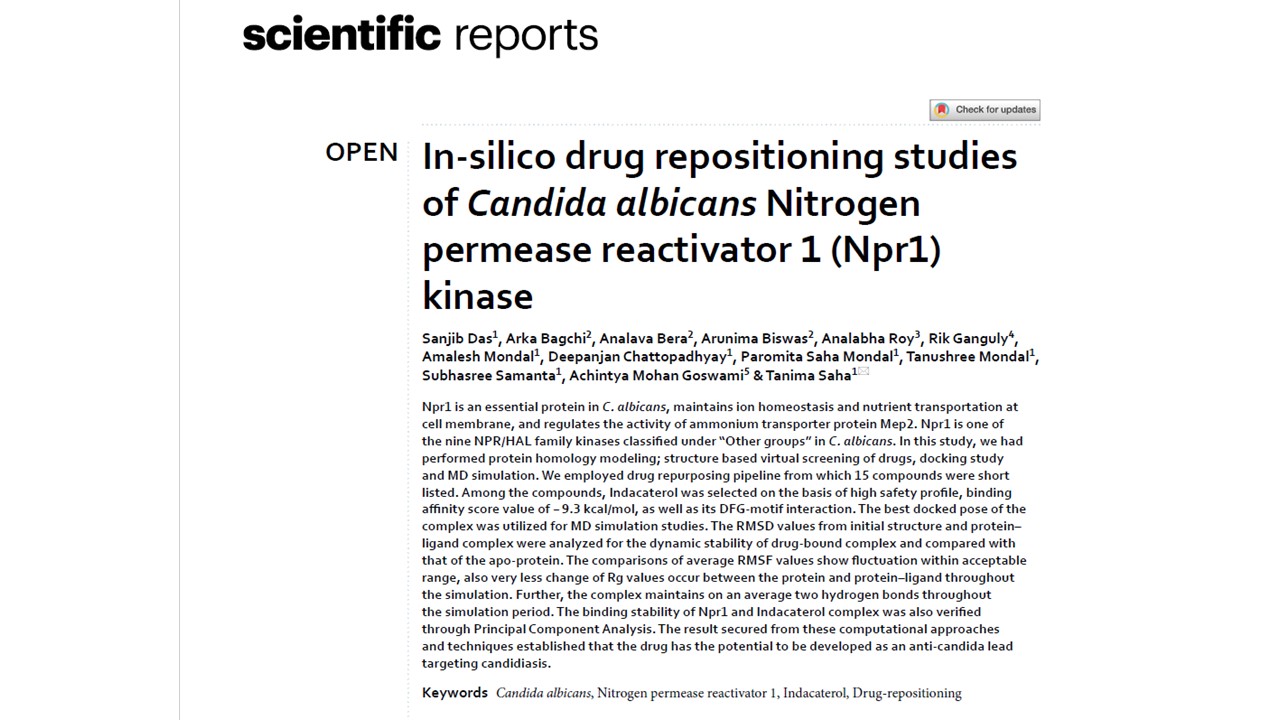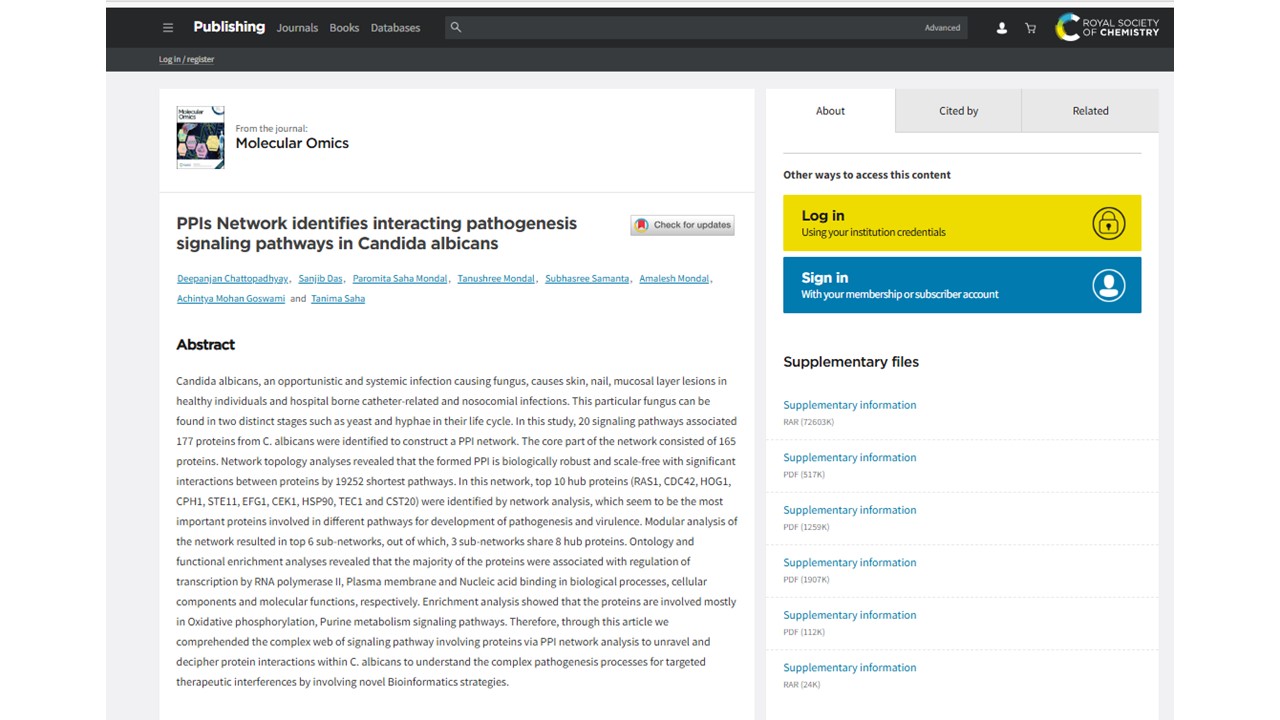
TANIMA SAHA
Associate Professor
Department: Department of Molecular Biology and BiotechnologyPhone Number: +91-9830186877
Institutional E-Mail: sahatanima@klyuniv.ac.in
Web URL: https://klyuniv.irins.org/profile/172147
Educational Qualifications:
Education
Ph.D. (2003-2008): Alma mater: Laboratory of Dr. Mina Mukherjee, Drug Development/Diagnostics & Biotechnology, Indian Institute of Chemical Biology, Kolkata, India
M.Sc. (Botany) (2000-2002): 1st Class, Alma mater: Ballygunge Science College, University of Calcutta
B.Sc. (Botany Honours) (1997-2000): 1st Class, Alma mater: Bethune College, University of Calcutta
Post Doctoral Research
Alma mater:
Laboratory of Dr. Mina Mukherjee, Drug Development/Diagnostics & Biotechnology, Indian Institute of Chemical Biology, Kolkata, India (2008-2009)
Laboratory of Prof. Peter G. Smith, Institute for Reproductive Health and Regenerative Medicine, Department of Molecular and Integrative Physiology, Kansas University Medical Center, KS, USA (2009)
2005 Availed: CSIR-NET-SRF
2003 Availed: CSIR-NET-JRF [Qualified December, 2002]
2003: GATE-IITM
Research experience: Since 2003
Currently, our laboratory primarily focuses on Cancer Biology. We investigate a range of proteins and genes that play a role in various oncogenic pathways, focusing primarily on their structural and functional aspects. We mainly work using Bioinformatics, Computational and Machine Learning tools.
Our laboratory has previously engaged in research on a range of patho-virulence proteins from fungal sources. Additionally, we have been involved in studies relating to Bioprocess Engineering to produce several products of significant industrial importance.
Details can be accessed with the following link:
https://scholar.google.com/citations?user=03kVwK8AAAAJ&hl=en&oi=ao
Teaching experience: Since 2010
Career History
Associate Professor in the Department of Molecular Biology & Biotechnology, University of Kalyani, Kalyani, since April 2024.
Assistant Professor in the Department of Molecular Biology & Biotechnology, University of Kalyani, Kalyani, since April 2012-April 2024.
Assistant Professor in the Department of Botany & Forestry, Vidyasagar University, Midnapore, for March-April 2012.
Guest Faculty in the Department of Microbiology, West Bengal State University, Barasat, for January 2010-March 2012.
My teaching areas include Cancer Biology, Microbiology, Bioprocess Engineering and Environmental Science.
Details can be accessed with the following link:
https://scholar.google.com/citations?user=03kVwK8AAAAJ&hl=en&oi=ao
However, following is the brief outline of the scholar-wise & my publications from my end.
……………………………………
Scholar 1: Rinku Debnath [Worked with WoS-B Fellowship, qualified ICAR-NET, also was URS] Awarded
1. Debnath, R., Das, S., Mukhopadhyay, A., & Saha, T. (2021). Enrichment of laccase production by Phomaherbarum isolate KU4 under solid‐state fermentation by optimizing RSM coefficients using genetic algorithm. Letters in Applied Microbiology, 73(4), 515-528.
2. Debnath, R., Mistry, P., Roy, P., Roy, B., & Saha, T. (2021). Partial purification and characterization of a thermophilic and alkali-stable laccase of Phoma herbarum isolate KU4 with dye-decolorization efficiency. Preparative Biochemistry & Biotechnology, 51(9), 901-918.
3. Debnath, R., & Saha, T. (2020). An insight into the production strategies and applications of the ligninolytic enzyme laccase from bacteria and fungi. Biocatal. Agric. Biotechnol. 2020; 26: 101645.
4. Debnath, R., & Saha, T. (2019). Identification and characterization of an industrially important enzyme laccase from Fusarium sp. FW2PhC1. In Biotechnology and Biological Sciences (pp. 57-63). CRC Press.
5. Hazra Chowdhury, A., Debnath, R., Manirul Islam, S. K., & Saha, T. (2019). Impact of nanoparticle shape, size, and properties of silver nanocomposites and their applications. Sustainable Polymer Composites and Nanocomposites, 1067-1091.
6. Chowdhury, A. H., Salam, N., Debnath, R., Islam, S. M., & Saha, T. (2019). Design and fabrication of porous nanostructures and their applications. In Nanomaterials Synthesis (pp. 265-294). Elsevier.
……………………………………
Scholar 2: Priyabrata Roy [Earned ICMR-SRF] Awarded
1. Roy, P., Deb, D., Suganya, A., Roy, B., Pradeep, T., & Saha, T. (2023). Endangered indigenous rice varieties as a source of B vitamins for the undernourished population. Cereal Chemistry, 100(4), 887-894.
2. Roy, P., & Saha, T. (2022). Specialty Traditional Rice Landraces: Its Nutraceutical and Therapeutic Potentiality for Human Health. In Response of Field Crops to Abiotic Stress (pp. 251-268). CRC Press.
3. Roy, P., Deb, D., Pradeep, T., Talai-Mukhopadhyay, S., Sinha, A. K., & Saha, T. (2021). Comparative analyses of the nutraceutical potentialities of selected Indian traditional black rice (Oryza sativa L.) landraces.
4. Debnath, R., Mistry, P., Roy, P., Roy, B., & Saha, T. (2021). Partial purification and characterization of a thermophilic and alkali-stable laccase of Phoma herbarum isolate KU4 with dye-decolorization efficiency. Preparative Biochemistry & Biotechnology, 51(9), 901-918. 2021
……………………………………
Scholar 3: Amalesh Mondal [Qualified CSIR NET-LS] Awarded
1. Das, S., Bagchi, A., Bera, A., Biswas, A., Roy, A., Ganguly, R., Mondal, A., Chattopadhyay, D., Saha Mondal, P., Mondal, T., Samanta, S., Goswami, A.M., Saha, T. (2005) In-silico drug repositioning studies of Candida albicans Nitrogen permease reactivator 1 (Npr1) kinase, Scientific Reports, 15 (23626 (2025)), 1-18
2. Chattopadhyay, D., Das, S., Saha Mondal, P., Mondal, T., Samanta, S., Mondal, A., Das, A., Saha, T. (2025) PPIs Network identifies interacting pathogenesis signaling pathways in Candida albicans. Molecular Omics, 2025, 21, 315–333
3. Mondal, T., Chattopadhyay, D., Saha Mondal, P., Das, S., Mondal, A., Das, A., Samanta, S., Saha, T. (2025) Fusobacterium nucleatum modulates the Wnt/β-catenin pathway in colorectal cancer development. International Journal of Biological Macromolecules, 299, 140196, 1 – 14
4. Mondal, A., Paul, D., Dastidar, S. G., Saha, T., & Goswami, A. M. (2022). In silico analyses of Wnt1 nsSNPs reveal structurally destabilizing variants, altered interactions with Frizzled receptors and its deregulation in tumorigenesis. Scientific Reports, 12(1), 14934.
5. Mondal, A., Goswami, A. M., & Saha, T. (2021). In silico prediction of the functional consequences of nsSNPs in human beta-catenin gene. Gene Reports, 23, 101066.
……………………………………
Scholar 4: Sanjib Das [Qualified GATE & SET] Awarded
1. Das, S., Bagchi, A., Bera, A., Biswas, A., Roy, A., Ganguly, R., Mondal, A., Chattopadhyay, D., Saha Mondal, P., Mondal, T., Samanta, S., Goswami, A.M., Saha, T. (2005) In-silico drug repositioning studies of Candida albicans Nitrogen permease reactivator 1 (Npr1) kinase, Scientific Reports, 15 (23626 (2025)), 1-18
2. Chattopadhyay, D., Das, S., Saha Mondal, P., Mondal, T., Samanta, S., Mondal, A., Das, A., Saha, T. (2025) PPIs Network identifies interacting pathogenesis signaling pathways in Candida albicans. Molecular Omics, 2025, 21, 315–333
3. Mondal, T., Chattopadhyay, D., Saha Mondal, P., Das, S., Mondal, A., Das, A., Samanta, S., Saha, T. (2025) Fusobacterium nucleatum modulates the Wnt/β-catenin pathway in colorectal cancer development. International Journal of Biological Macromolecules, 299, 140196, 1 – 14
4. Das, S., Goswami, A. M., & Saha, T. (2022). An insight into the role of protein kinases as virulent factors, regulating pathogenic attributes in Candida albicans. Microbial Pathogenesis, 164, 105418.
5. Das, S., Bhuyan, R., Goswami, A. M., & Saha, T. (2021). Kinome analyses of Candida albicans, C. parapsilosis and C. tropicalis enable novel kinases as therapeutic drug targets in candidiasis. Gene, 780, 145530.
6. Das, S., Bhuyan, R., Bagchi, A., & Saha, T. (2019). Network analysis of hyphae forming proteins in Candida albicans identifies important proteins responsible for pathovirulence in the organism. Heliyon, 5(6).
7. Debnath, R., Das, S., Mukhopadhyay, A., & Saha, T. (2021). Enrichment of laccase production by Phoma herbarum isolate KU4 under solid‐state fermentation by optimizing RSM coefficients using genetic algorithm. Letters in Applied Microbiology, 73(4), 515-528.
……………………………………
Scholar 5: Paromita Saha Mondal [Qualified NET-LS, also the URS]
1. Das, S., Bagchi, A., Bera, A., Biswas, A., Roy, A., Ganguly, R., Mondal, A., Chattopadhyay, D., Saha Mondal, P., Mondal, T., Samanta, S., Goswami, A.M., Saha, T. (2005) In-silico drug repositioning studies of Candida albicans Nitrogen permease reactivator 1 (Npr1) kinase, Scientific Reports, 15 (23626 (2025)), 1-18
2. Chattopadhyay, D., Das, S., Saha Mondal, P., Mondal, T., Samanta, S., Mondal, A., Das, A., Saha, T. (2025) PPIs Network identifies interacting pathogenesis signaling pathways in Candida albicans. Molecular Omics, 2025, 21, 315–333
3. Mondal, T., Chattopadhyay, D., Saha Mondal, P., Das, S., Mondal, A., Das, A., Samanta, S., Saha, T. (2025) Fusobacterium nucleatum modulates the Wnt/β-catenin pathway in colorectal cancer development. International Journal of Biological Macromolecules, 299, 140196, 1 – 14
……………………………………
Scholar 6: Deepanjan Chattopadhyay [SVM fellow]
1. Das, S., Bagchi, A., Bera, A., Biswas, A., Roy, A., Ganguly, R., Mondal, A., Chattopadhyay, D., Saha Mondal, P., Mondal, T., Samanta, S., Goswami, A.M., Saha, T. (2005) In-silico drug repositioning studies of Candida albicans Nitrogen permease reactivator 1 (Npr1) kinase, Scientific Reports, 15 (23626 (2025)), 1-18
2. Chattopadhyay, D., Das, S., Saha Mondal, P., Mondal, T., Samanta, S., Mondal, A., Das, A., Saha, T. (2025) PPIs Network identifies interacting pathogenesis signaling pathways in Candida albicans. Molecular Omics, 2025, 21, 315–333
3. Mondal, T., Chattopadhyay, D., Saha Mondal, P., Das, S., Mondal, A., Das, A., Samanta, S., Saha, T. (2025) Fusobacterium nucleatum modulates the Wnt/β-catenin pathway in colorectal cancer development. International Journal of Biological Macromolecules, 299, 140196, 1 – 14
……………………………………
Scholar 7: Tanushree Mondal [UGC-NET-JRF]
1. Das, S., Bagchi, A., Bera, A., Biswas, A., Roy, A., Ganguly, R., Mondal, A., Chattopadhyay, D., Saha Mondal, P., Mondal, T., Samanta, S., Goswami, A.M., Saha, T. (2005) In-silico drug repositioning studies of Candida albicans Nitrogen permease reactivator 1 (Npr1) kinase, Scientific Reports, 15 (23626 (2025)), 1-18
2. Chattopadhyay, D., Das, S., Saha Mondal, P., Mondal, T., Samanta, S., Mondal, A., Das, A., Saha, T. (2025) PPIs Network identifies interacting pathogenesis signaling pathways in Candida albicans. Molecular Omics, 2025, 21, 315–333
3. Mondal, T., Chattopadhyay, D., Saha Mondal, P., Das, S., Mondal, A., Das, A., Samanta, S., Saha, T. (2025) Fusobacterium nucleatum modulates the Wnt/β-catenin pathway in colorectal cancer development. International Journal of Biological Macromolecules, 299, 140196, 1 – 14
……………………………………
Scholar 8: Madhurima Roy [UGC-NET-JRF]
1. Roy, M., Paul, C., Pal, N., Saha, T., Das, D. (2025) Pharmacological and Therapeutic Inventory of Fungi in Cancer Therapy – A Comprehensive Review. AIMS Molecular Science, 12(1), 67-98
……………………………………
Tanima Saha
1. Das, S., Bagchi, A., Bera, A., Biswas, A., Roy, A., Ganguly, R., Mondal, A., Chattopadhyay, D., Saha Mondal, P., Mondal, T., Samanta, S., Goswami, A.M., Saha, T. (2005) In-silico drug repositioning studies of Candida albicans Nitrogen permease reactivator 1 (Npr1) kinase, Scientific Reports, 15 (23626 (2025)), 1-18
2. Chattopadhyay, D., Das, S., Saha Mondal, P., Mondal, T., Samanta, S., Mondal, A., Das, A., Saha, T. (2025) PPIs Network identifies interacting pathogenesis signaling pathways in Candida albicans. Molecular Omics, 21, 315–333
3. Roy, M., Paul, C., Pal, N., Saha, T., Das, D. (2025) Pharmacological and Therapeutic Inventory of Fungi in Cancer Therapy – A Comprehensive Review. AIMS Molecular Science, 12(1), 67-98
4. Mondal, T., Chattopadhyay, D., Saha Mondal, P., Das, S., Mondal, A., Das, A., Samanta, S., Saha, T. (2025) Fusobacterium nucleatum modulates the Wnt/β-catenin pathway in colorectal cancer development. International Journal of Biological Macromolecules, 299, 140196, 1 – 14
5. Roy, P., Deb, D., Suganya, A., Roy, B., Pradeep, T., & Saha, T. (2023). Endangered indigenous rice varieties as a source of B vitamins for the undernourished population. Cereal Chemistry, 100(4), 887-894.
6. Burke, A. D., Burns, J. W., Chakraborty, S., Saha, T., Ray, A., & Borsch, D. M. (2022). Evaluation of cancer awareness, cancer education, and prevention intervention techniques among university-level students in the United States and India. Journal of Education and Health Promotion, 11(1), 187.
7. Roy, P., & Saha, T. (2022). Specialty Traditional Rice Landraces: Its Nutraceutical and Therapeutic Potentiality for Human Health. In Response of Field Crops to Abiotic Stress (pp. 251-268). CRC Press.
8. Chakrabarti, M., & Saha, T. (2022). Identification of human microRNAs targeting Pseudomonas aeruginosa genes by an in silico hybridization method. Informatics in Medicine Unlocked, 34, 101110.
9. Mondal, A., Paul, D., Dastidar, S. G., Saha, T., & Goswami, A. M. (2022). In silico analyses of Wnt1 nsSNPs reveal structurally destabilizing variants, altered interactions with Frizzled receptors and its deregulation in tumorigenesis. Scientific Reports, 12(1), 14934.
10. Das, S., Goswami, A. M., & Saha, T. (2022). An insight into the role of protein kinases as virulent factors, regulating pathogenic attributes in Candida albicans. Microbial Pathogenesis, 164, 105418.
11. Debnath, R., Das, S., Mukhopadhyay, A., & Saha, T. (2021). Enrichment of laccase production by Phoma herbarum isolate KU4 under solid‐state fermentation by optimizing RSM coefficients using genetic algorithm. Letters in Applied Microbiology, 73(4), 515-528.
12. Roy, P., Deb, D., Pradeep, T., Talai-Mukhopadhyay, S., Sinha, A. K., & Saha, T. (2021). Comparative analyses of the nutraceutical potentialities of selected Indian traditional black rice (Oryza sativa L.) landraces.
13. Mondal, A., Goswami, A. M., & Saha, T. (2021). In silico prediction of the functional consequences of nsSNPs in human beta-catenin gene. Gene Reports, 23, 101066.
14. Das, S., Bhuyan, R., Goswami, A. M., & Saha, T. (2021). Kinome analyses of Candida albicans, C. parapsilosis and C. tropicalis enable novel kinases as therapeutic drug targets in candidiasis. Gene, 780, 145530.
15. Debnath, R., Mistry, P., Roy, P., Roy, B., & Saha, T. (2021). Partial purification and characterization of a thermophilic and alkali-stable laccase of Phomaherbarum isolate KU4 with dye-decolorization efficiency. Preparative Biochemistry & Biotechnology, 51(9), 901-918.
16. Debnath, R., & Saha, T. (2020). An insight into the production strategies and applications of the ligninolytic enzyme laccase from bacteria and fungi. Biocatal Agric Biotechnol. 2020; 26: 101645.
17. Debnath, R., & Saha, T. (2019). Identification and characterization of an industrially important enzyme laccase from Fusarium sp. FW2PhC1. In Biotechnology and Biological Sciences (pp. 57-63). CRC Press.
18. Das, S., Bhuyan, R., Bagchi, A., & Saha, T. (2019). Network analysis of hyphae forming proteins in Candida albicans identifies important proteins responsible for pathovirulence in the organism. Heliyon, 5(6).
19. Hazra Chowdhury, A., Debnath, R., Manirul Islam, S. K., & Saha, T. (2019). Impact of nanoparticle shape, size, and properties of silver nanocomposites and their applications. Sustainable Polymer Composites and Nanocomposites, 1067-1091.
20. Chowdhury, A. H., Salam, N., Debnath, R., Islam, S. M., & Saha, T. (2019). Design and fabrication of porous nanostructures and their applications. In Nanomaterials Synthesis (pp. 265-294). Elsevier.
21. Saha, T., Sasmal, S., Alam, S., & Das, N. (2014). Tamarind kernel powder: a novel agro-residue for the production of cellobiose dehydrogenase under submerged fermentation by Termitomyces clypeatus. Journal of agricultural and food chemistry, 62(15), 3438-3445.
22. Saha, T., Ghosh, D., Mukherjee, S., Bose, S., & Mukherjee, M. (2008). Cellobiose dehydrogenase production by the mycelial culture of the mushroom Termitomyces clypeatus. Process Biochemistry, 43(6), 634-641.
23. Saha, T. (2008). Studies on Cellobiose Dehydrogenase of Termitomyces clypeatus (Doctoral dissertation, Jadavpur University).
24. Saha, T., Chakraborty, T. K., Saha, R., Das, N., & Mukherjee, M. (2005). Interference of laccase in determination of cellobiose dehydrogenase activity of Pleurotus ostreatus (Florida) using dichlorophenol indophenol as the electron acceptor. Journal of Basic Microbiology: An International Journal on Biochemistry, Physiology, Genetics, Morphology, and Ecology of Microorganisms, 45(2), 142-146.
Details can be accessed with the following link:
https://scholar.google.com/citations?user=03kVwK8AAAAJ&hl=en&oi=ao
1. Delivered invited lectures on hands-on workshop on Molecular Diagnostics from 6th January 2025 to 10th January 2025 at RISE Foundation IISER, IISER-Kolkata
2. Delivered invited lecture at “Gāṅgeya,” the Student Chapter of Eastern India, on the theme of “Learning Bridges: Algorithms and Experiments in Biophysics,” to celebrate International Biophysics Week on March 18, 2025, at IISER-Kolkata.
3. Delivered invited lecture on June 15, 2025, at the Faculty Development Program themed ‘Implications and Applications of Biotechnology in Pharmaceutical Industry and Environment’ organized from June 11, 2025 – June 15, 2025, by Guru Nanak Institute of Pharmaceutical Science and Technology.
4. Delivered invited lecture on October 25, 2025, on the occasion of Observation of Breast Cancer Awareness Month 2025, by the Department of Nutrition, Prabhat Kumar College, Contai.
SCOPUS ID https://www.scopus.com/authid/detail.uri?authorId=8374388400
Google Scholar ID https://scholar.google.com/citations?user=03kVwK8AAAAJ&hl=en&oi=ao
VIAF ID https://vidwan.inflibnet.ac.in/profile/172147
Notable Activities
Associated with Jagadis Bose National Science Talent Search or JBNSTS.
In addition to academic and research activities, I am involved with virtual social outreach programs through my YouTube channel (YouTube handle: @JustTanima_Barbie, link: https://www.youtube.com/@JustTanima_Barbie) that includes various topics on Cancer Biology and Mental Health.
PhD
AWARDED
1. 2021: PhD: Studies on ligninolytic enzyme laccase, from an isolated fungus belonging to the genus Phoma
Rinku Debnath, University of Kalyani
2. 2022: PhD: Nutraceutical Analyses of Traditional Indica Rice Landraces
Priyabrata Roy, University of Kalyani
3. 2024: PhD: In silico characterization of non-synonymous single nucleotide polymorphisms in human canonical Wnt signaling pathway genes
AMALESH MONDAL, University of Kalyani
4. 2024: PhD: IDENTIFICATION OF IMPORTANT PATHOVIRULENT KINASE PROTEINS IN CANDIDA ALBICANS TO DEVELOP NOVEL THERAPEUTIC TARGETS
Sanjib Das, KALYANI UNIVERSITY
………………………………………..
ONGOING
1. Paromita Saha Mondal: On Apoptosis
2. Deepanjan Chattopadhyay: On Lung Cancer
3. Tanushree Mondal: On Colon Cancer
4. Madhurima Roy: On Breast Cancer
………………………………………..
DISSERTATION:
Completed
1. Sayantan Sarkar: M. Sc., MITS School of Biotechnology, Bhubaneswar, Odisha [06.01.2020 – 16.03.2020]: Part of the course
2. Nupur Pal: Integrated degree (B. Tech. + M. Tech.), Biotechnology, Techno India University, West Bengal [May 14, 2024 – June 10, 2024]: Voluntary
3. Utshadeb Gayen: M. Sc., Biochemistry, Calcutta University, West Bengal [June 23, 2024 – August 23, 2024]: Part of the course
4. Debasmita Chatterjee: B. Sc., Forensic Science, Lovely Professional University, Punjab [July 1, 2024 – September 1, 2024]: Voluntary, Remote
5. Rajarshi Chattopadhyay: M. Sc., Interdisciplinary Science, JNCASR, Bengaluru [July 1, 2024 – September 1, 2024]: Voluntary, Remote
6. Ankush Nandi: B. Tech., Biotechnology, NIT-Durgapur, West Bengal [December 05, 2024 – December 20, 2024]: Voluntary
7. Aniket Hazra: M. Sc., Molecular Biology & Biotechnology, Kalyani University, West Bengal: [March 11, 2025 – April 11,2025]: Voluntary
8. Ankit Dey: B. Tech. (Dual Degree), Biotechnology, NIT-Durgapur, West Bengal [May 05, 2025 – June 09, 2025: Voluntary
9. Subhajit Chatterjee: B. Tech., Biotechnology, NIT-Durgapur, West Bengal [May 05, 2025 – June 09, 2025]: Voluntary
10. Pritam Bera: M. Sc., Biotechnology, Burdwan University, West Bengal: [February 10, 2025 – May 31, 2025]: Voluntary
11. Srestha Sett: B. Tech., Biotechnology, NIT-Durgapur, West Bengal [May 26, 2025 – June 10, 2025]: Voluntary
12. Soumyadip Biswas: B. Sc., Microbiology, Ramakrishna Mission Vidyamandira, Belur, Howrah, West Bengal: [May 16, 2025 – June 16, 2025]: Part of the course
13. Mayukh Mazumder: B. Sc., Microbiology, Ramakrishna Mission Vidyamandira, Belur, Howrah, West Bengal: [May 16, 2025 – June 16, 2025]: Part of the course
14. Sakhawat Hossain: B. Sc., Microbiology, Ramakrishna Mission Vidyamandira, Belur, Howrah, West Bengal: [May 16, 2025 – June 16, 2025]: Part of the course
15. Supratim Ghosh: B. Sc., Microbiology, Ramakrishna Mission Vidyamandira, Belur, Howrah, West Bengal: [May 16, 2025 – June 16, 2025]: Part of the course
16. Ishita Dey: M. Sc., Biotechnology, Burdwan University, West Bengal: [May 05, 2025 – June, 30, 2025]: Part of the course
17. Rohit Roy: B. Sc., Zoology, Ramakrishna Mission Vidyamandira, Belur, Howrah, West Bengal: [May 28, 2025 – June, 30, 2025]: Voluntary
18. Sudipta Karmakar, M. Sc., Botany, Visva Bharati, Santiniketan, West Bengal: [June 13, 2025 – July, 13, 2025]: Voluntary
19. Shrinjoy Biswas, B. Tech., Biotechnology, Adamas University, Kolkata: [June 02, 2025 – July, 16, 2025]: Voluntary
20. Soham Raj Maity: B. Sc., Zoology, Ramakrishna Mission Vidyamandira, Belur, Howrah, West Bengal: [May 26, 2025 – July 26, 2025]: Voluntary
21. Dhrubajyoti Ganguly: B. Sc., Microbiology, Ramakrishna Mission Vidyamandira, Belur, Howrah, West Bengal: [May 28, 2025 – July 28, 2025]: Voluntary
22. Jeet Sarkar: B.Tech., Biotechnology, Adamas University, Kolkata [July 01, 2025 – August 01, 2025]: Voluntary
23. Eshani Mazumder: M. Sc., Biotechnology, SRM University, Delhi -NCR, Sonepat: [July 08, 2025 – August 08, 2025]: Voluntary
24. Sayak Das: M. Sc., Biotechnology, SRM University, Delhi -NCR, Sonepat: [July 08, 2025 – August 08, 2025]: Voluntary
25. Anubhab Bhattacharya: M. Sc., Biotechnology, SRM University, Delhi -NCR, Sonepat: [July 08, 2025 – August 08, 2025]: Voluntary
26. Sayantan Dalapati: M. Sc., Biotechnology, SRM University, Delhi -NCR, Sonepat: [July 08, 2025 – August 08, 2025]: Voluntary
27. Rikta Mondal, M. Sc., Genetics, Ballygunge Science College Campus, University of Calcutta: [June 02, 2025 – August 02, 2025]: Part of the course
28. Deep Kumar Mete: M. Sc., Biochemistry, Calcutta University, West Bengal [June 16, 2025 – August 16, 2025]: Part of the course
………………………………………..
Ongoing
1. Soumyadeep Das, B.Tech., Biotechnology, Techno India University, Kolkata: [July 01, 2025 – Present]: Voluntary
2. Ritam Paul, M. Sc., Microbiology, JIS University, Agarpara: [July 01, 2025 – Present]: Voluntary
3. Sayantan Das: B.Tech., Biotechnology, Techno India University, Kolkata: [July 25, 2025 – Present]: Voluntary
4. Soumyadeep Das: B.Tech., Biotechnology, Techno India University, Kolkata: [July 25, 2025 – Present]: Voluntary
5. Swadhin Bhattacharya: B.Tech., Biotechnology, Techno India University, Kolkata: [July 25, 2025 – Present]: Voluntary
6. Swagato Mondal: B.Tech., Biotechnology, Techno India University, Kolkata: [July 25, 2025 – Present]: Voluntary
7. Priyasmita Ghosh: B.Tech., Biotechnology, Techno India University, Kolkata: [July 25, 2025 – Present]: Voluntary
8. Arijit Guchhait: M. Sc., Microbiology, APC College, New Barrackpore: [September 01, 2025 – Present]: Voluntary
9. Sagnik Chaki: B. Sc., Molecular Biology & Biotechnology, Kalyani Mahavidyalaya, Kalyani: [December 09, 2025 – Present]
10. Shabnam: M. Sc., Biomedical Genetics, Vellore Institute of Technology, Vellore: [January 07, 2026 – Present]
11. Mainak Mondal: B. Sc., Biotechnology, Burdwan Institute of Management and Computer Science (affiliated with The University of Burdwan), Burdwan: [January 14, 2026 – Present]
12. Ankita Sutradhar: M.Sc., Biotechnology, Sister Nivedita University, Kolkata [January 15, 2026 – Present]
| Sl. No | Name | Photo | Current Status |
|---|---|---|---|
| 1 | Madhurima Roy |

|
Ongoing (PhD) |
| 2 | Tanushree Mondal |

|
Ongoing (PhD) |
| 3 | Deepanjan Chattopadhyay |

|
Ongoing (PhD) |
| 4 | Paromita Saha Mondal |

|
Ongoing (PhD) |
| 5 | Amalesh Mondal |

|
PhD Awarded [2024] |
| 6 | Sanjib Das |

|
PhD Awarded [2024] |
| 7 | Priyabrata Roy |

|
PhD Awarded [2022] |
| 8 | Rinku Debnath |

|
PhD Awarded [2021] |
TS lab is open for interns and post-doctoral fellows throughout the year. Candidates interested to pursue research in Cancer Biology & Bioinformatics are encouraged to apply through emails. Interested candidates having their own fellowships (CSIR/UGC/DBT/ICMR JRFs or with INSPIRE fellowships) are requested to contact for doctoral research.






